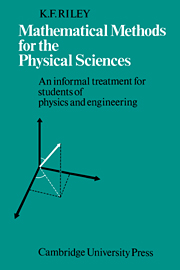 Mathematical Methods for the Physical Sciences
Mathematical Methods for the Physical Sciences Book contents
- Frontmatter
- Contents
- Preface
- Mathematical symbols
- 1 PRELIMINARY CALCULUS
- 2 VECTOR ALGEBRA
- 3 CALCULUS OF VECTORS
- 4 VECTOR OPERATORS
- 5 ORDINARY DIFFERENTIAL EQUATIONS
- 6 SERIES SOLUTIONS OF DIFFERENTIAL EQUATIONS
- 7 SUPERPOSITION METHODS
- 8 FOURIER METHODS
- 9 PARTIAL DIFFERENTIAL EQUATIONS
- 10 SEPARATION OF VARIABLES
- 11 NUMERICAL METHODS
- 12 CALCULUS OF VARIATIONS
- 13 GENERAL EIGENVALUE PROBLEM
- 14 MATRICES
- 15 CARTESIAN TENSORS
- 16 COMPLEX VARIABLES
- SOLUTIONS AND HINTS FOR EXERCISES AND EXAMPLES
- INDEX
- Frontmatter
- Contents
- Preface
- Mathematical symbols
- 1 PRELIMINARY CALCULUS
- 2 VECTOR ALGEBRA
- 3 CALCULUS OF VECTORS
- 4 VECTOR OPERATORS
- 5 ORDINARY DIFFERENTIAL EQUATIONS
- 6 SERIES SOLUTIONS OF DIFFERENTIAL EQUATIONS
- 7 SUPERPOSITION METHODS
- 8 FOURIER METHODS
- 9 PARTIAL DIFFERENTIAL EQUATIONS
- 10 SEPARATION OF VARIABLES
- 11 NUMERICAL METHODS
- 12 CALCULUS OF VARIATIONS
- 13 GENERAL EIGENVALUE PROBLEM
- 14 MATRICES
- 15 CARTESIAN TENSORS
- 16 COMPLEX VARIABLES
- SOLUTIONS AND HINTS FOR EXERCISES AND EXAMPLES
- INDEX
Summary
It will undoubtedly have been observed by the reader who has only a moderate familiarity with the mathematical methods used for physical problems, that harmonic waves (of the form exp (iωt) or cos ωt) are very convenient functions to deal with. It is straightforward to differentiate, integrate and multiply them; their moduli are easily taken, and each contains only one frequency [or wavenumber, for forms like exp (ikx), using an obvious notation]. This last point is important since the response of many physical systems, such as an electronic circuit or a prism, depends most directly on the frequency content of the input the system receives.
Even if we were not familiar with the results of the Sturm–Liouville theory discussed in the previous chapter, these properties by themselves would indicate that it may be advantageous in some cases to express all the functions involved in a problem as superpositions of harmonic wave functions (Fourier series or transforms). The otherwise difficult parts of the problem might then be carried through more simply, and finally, if necessary, the output functions reconstituted from the ‘processed’ waves.
In fact, we recognize the harmonic wave y(x) = exp (ikx) as an eigenfunction of the simplest non-trivial Sturm-Liouville equation, with p = 1, q = 0, ρ = 1 and λ = k2, and thus, provided that, we may apply the general results of chapter 7. This boundary condition is clearly going to be satisfied if we consider periodic problems of period b – a, and so we are led to Fourier series, or if a → - ∞ and b → ∞, to Fourier transforms.
- Type
- Chapter
- Information
- Mathematical Methods for the Physical SciencesAn Informal Treatment for Students of Physics and Engineering, pp. 190 - 224Publisher: Cambridge University PressPrint publication year: 1974


